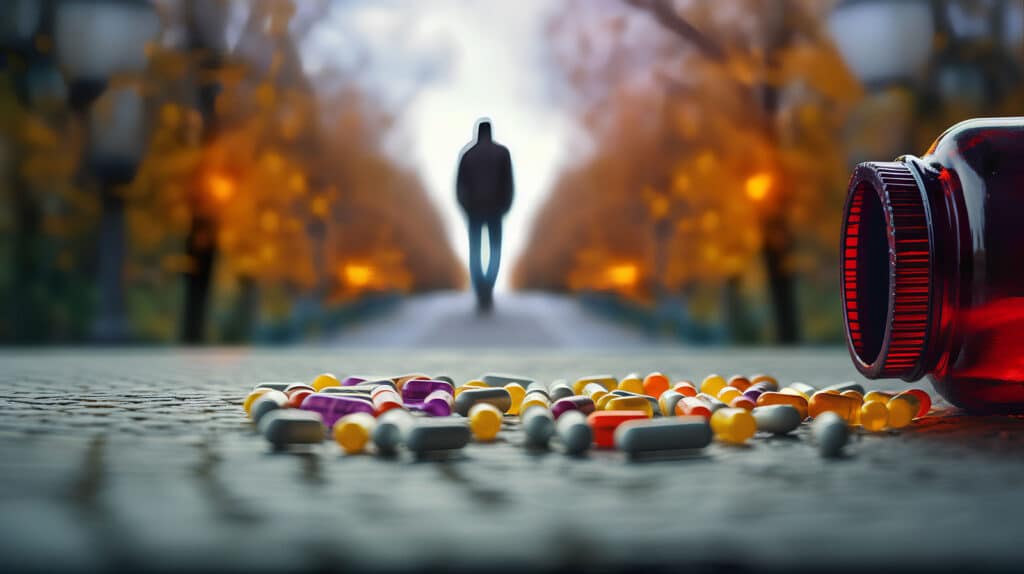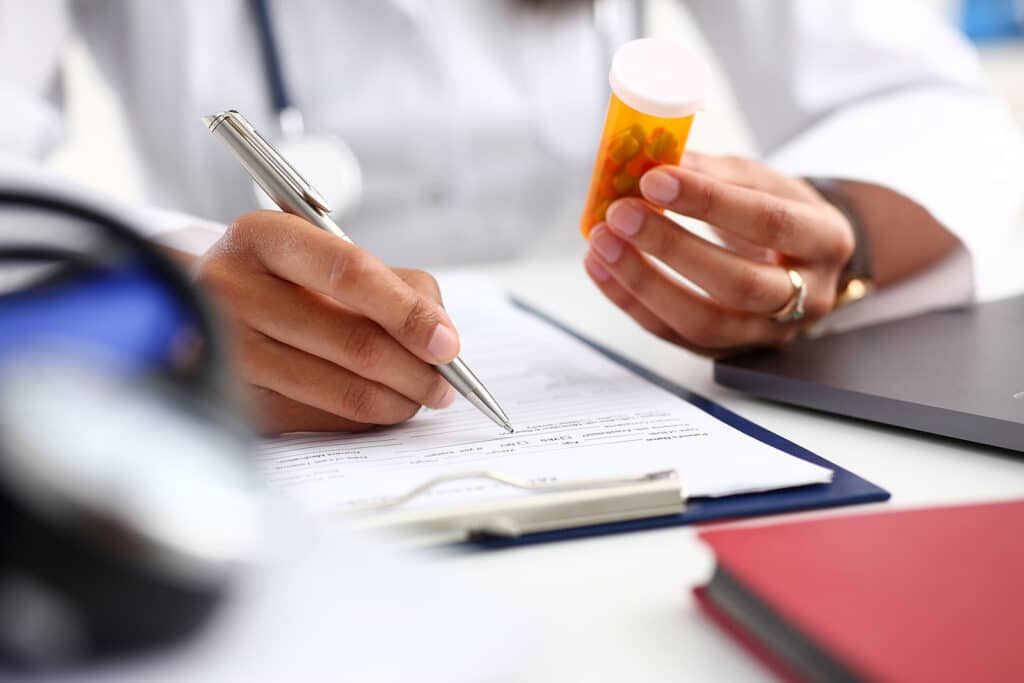Medical Detox eliminates harmful substances from the body, including drugs and alcohol. Before entering addiction treatment at a recovery center, it is essential that a person completes detox. In fact, this is the process of eliminating harmful substances from the body, including drugs and alcohol.
To be sure, it is essential for a person to turn to a trusted drug detox center for assistance. Detoxing from drugs alone is dangerous and can negatively impact the recovery process in the long term. Here at Illinois Recovery Center, we offer medical detox treatment to start the journey of addiction recovery.
Table of Contents
What Is Medical Detox?
When an individual becomes dependent on drugs or has succumbed to alcohol addiction, the sudden stopping of these substances leads to physical, behavioral, and psychological symptoms. The symptoms of withdrawal may be uncomfortable for some.

Medical detoxification gives a person a safe place to complete the withdrawal process. In other words, medical supervision is provided. Generally, a person may receive medicine to relieve specific symptoms from detoxification. Indeed, this makes the process safer and more accessible.
Benefits Of Medical Detox
Being the first step in a person’s recovery journey from substance use disorder, detoxification is crucial before beginning a substance abuse treatment program. There are various benefits of medical detox. They include:
- Lowers withdrawal symptoms
- Reverses cravings
- Decreases the usage of alcohol, opioids, methamphetamine, and similar substances
- Promotes long-term sobriety
- Heightens the recognition of therapy
- Eases the transition back to regular life after treatment services
- Helps to treat symptoms of co-occurring disorders
Regular Detoxification Vs. Medical-Assisted Detoxification
To be sure, a person can detox at home or at a specialized facility. Medication to ease withdrawal symptoms is not always used. However, medical detoxification always involves constant monitoring from doctors. A patient receives many positives by participating in this form of detox.
- Supervision. As previously mentioned, patients are constantly monitored throughout the detox process. In fact, staff adjusts medication and creates customized treatments.
- Safety. To be sure, detox can be very uncomfortable and can bring life-threatening symptoms. Supervision keeps patients safe at all times.
- Lower Pain. Since the staff can administer medication to ease withdrawal, patients experience less painful side effects.
- Raises the Likelihood of Recovery. Indeed, remaining in a detox facility ensures that a person’s body is ready to accept treatment. When drugs and alcohol are out of the person’s system, he or she can concentrate on recovery.
How Effective Is Medical Detox?
The detox process involves evaluation, stabilization, and preparation for therapy. Without medical supervision, a person may not be willing or able to ride out withdrawal symptoms. Therefore, a relapse often occurs. With medical assistance, a person can deal with cravings. To be sure, detox is the first step in the recovery process.

In particular, it kickstarts sobriety. In other words, detox rids the body of drugs that are causing confusion, depression, and other health-related symptoms. When the brain can think clearly, it is possible to tackle underlying issues that are causing drug misuse.
Also, it helps to preserve all the vital organs and systems within a person’s body. There are high recovery success rates for individuals who undergo medical detoxification.
Types of Medication Used During Medication-Assisted Treatment
To help patients deal with withdrawal, they are given controlled medication throughout the detox process. Indeed, no medicine can prevent all symptoms. However, some are used to control anxiety, depression, and sleep problems that occur when detox begins.
In detail, one of the most popular medications used during detoxification from opiates is methadone. This drug is a long-acting opioid agonist that lowers cravings and eases residual symptoms. SUBOXONE® is a mixture of buprenorphine and naloxone. It helps to lower withdrawal symptoms of drugs like heroin.
Benzodiazepines
Frequently, benzodiazepines (like Xanax) and tranquilizers are used to calm patients’ anxiety, insomnia, and mental health disorders like panic disorders. However, these drugs are often addicting. Therefore, they must be carefully monitored throughout the detox process. If a person does not have a history of benzodiazepine addiction, they can be very helpful.
Antipsychotics and Antidepressants
Indeed, some individuals suffer from both drug misuse disorders and mental illnesses at the same time. They are called co-occurring disorders. In this case, antipsychotics and antidepressants may be used during a detox program.
Even if a person does not have a mental illness, withdrawal can cause psychotic symptoms, including delusions and hallucinations. Drugs like Risperdal, Prozac, and Celexa are some examples that eliminate these symptoms.
Drugs For Alcohol Detox
When a person is addicted to alcohol, certain drugs are approved by the FDA that aid with detox and treatment. For example, acamprosate is just one medication that lowers a person’s dependence by reacting with the brain’s neurotransmitters.

Dangers Of Detoxing Without Medical Assistance
To repeat, detox is the first step toward preparing a person’s body for drug misuse treatment programs. Going through the process without medical assistance can be dangerous and cause individuals to experience fatal consequences without help.
Certain people decide to quit drugs or alcohol cold turkey. However, abruptly removing these substances from a person’s body can wreak havoc on his or her nervous system. For example, it may cause heart problems or seizures.
When a person quickly stops drinking or taking drugs, severe withdrawal symptoms set in. To avoid uncomfortable feelings, a person may be pushed back to using. However, his or her body will lose tolerance fast. As a result, taking his or her usual drug dose may lead to an overdose.
Specifically, the risks of alcohol misuse are more severe than other substances. Indeed, a person may experience loss of consciousness and other dangerous neurological symptoms. Without supervision, results may be fatal.
Finding An Illinois Drug Rehab Facility That Is Right For You
When a person is searching for a trusted treatment center that provides medication-assisted addiction treatment programs, Illinois Recovery Center is a top choice. We are a medical detox center offering top-notch detoxification programs with the best medical professionals on our team.

Our team consists of healthcare professionals who are Addiction Medicine Specialists certified by the American Board of Addiction Medicine.
Here at Illinois Recovery Center, we offer 24-hour inpatient addiction treatment, under our Residential Addiction Treatment. All medical care offered here at Illinois Recovery Center is an individualized treatment plan.
We have several treatment options, including medical detoxification. It is essential to understand that we utilize various therapies so that patients gain long-term sobriety.
If you want more information about medical detoxification, or want to enlist help for your loved one, please . Contact us today. We are here to help you find your freedom!
References
- https://dualdiagnosis.org/guide-drug-detox/what-medications-are-used/
- https://www.ncbi.nlm.nih.gov/books/NBK64119/
FAQ
What does detox mean in medicine?
How long does your body detox for?



